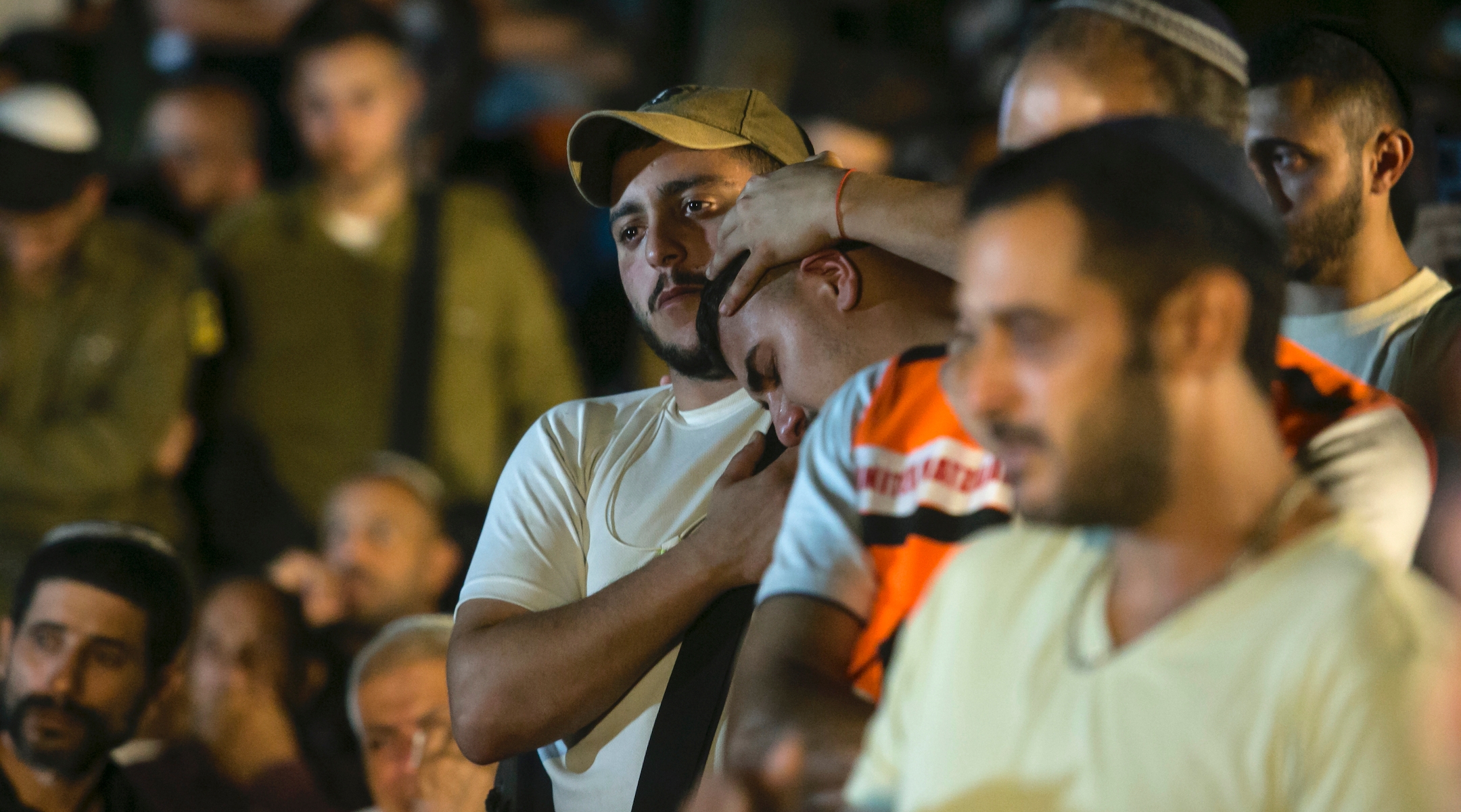How do we forge ahead after calamity? The Jewish way of mourning offers a roadmap.
Tradition understands the gradual, crooked path of recovering from tragedy, writes the cofounder of an Orthodox women’s yeshiva

Family and friends of fallen IDF soldier Amit Zur, who died in a battle with Hamas gunmen, react during his funeral in Eliayachin, Israel on Oct. 10, 2023. (Amir Levy/Getty Images)
(JTA) — On Monday morning, we began our day at Maharat, the women’s Orthodox yeshiva, with heartbreak. As we absorbed reports of the devastating Hamas attack on Israel, we decided to cancel class and instead gather as a community with students, alumnae and faculty to say Tehillim, or Psalms, and tefillot, prayer. With over 30 Maharat students, alumnae and faculty living in Israel, our focus was coming together after the horrific events of the weekend.
Our students in Israel shared their experiences on this unprecedented Simchat Torah, which fell in Israel on Shabbat. We heard about spouses who were called up to the front line. They had to leave their synagogues to don their uniforms; they kissed their children sweetly on their heads, hugged their wives and left for battle. We heard the quivering voices of mothers who watched as their sons left for the southern border. One mother told us that her soldier son is still able to call home and check in. She’s grateful, but petrified. Students spoke about how quickly they had to get to their safe rooms following a siren, how the shelves in supermarkets are empty and how their kids are at home with nothing to do.
While one of the students was speaking, she stopped in the middle of a sentence. “I have to go. There’s a siren.” Suddenly she and many of the other students left their Zoom square and headed for safety.
This year, we had planned our study of halacha, or Jewish law, to focus on the laws of aveilut, or mourning. The subject is either fitting or ironic, considering that so very many people are actually in mourning, in our community and across the Jewish world.
But beyond those who have lost family members and friends, aveilut reflects the emotional state of so many at this moment. It can also be a metaphor for the experience we are navigating right now.
Saturday morning, which was Shemini Atzeret and Simchat Torah in Israel, and Sunday, when Simchat Torah is celebrated in the Diaspora, felt like the state of aneinut, the in-between time before the burial where the law says we are exempt from doing things we are ordinarily commanded to do. We had to determine how to celebrate while beginning to mourn.
When the holiday ended, there was the acute pain akin to the burial: the realization that life as we knew it would be hard to manifest again. Like the kriya (ritual tearing of the mourners’ clothes), our hearts were ripped apart.
Then, as the hours passed, and many of us were able to connect with family and friends, the seven days of shiva set in. During shiva, life is disrupted, we are not able to sit comfortably, and we listen and process one another’s stories, trying to offer comfort, through words, hugs and of course, through food.
The rhythm of mourning is not a straight line. There will be times that may even feel “normal.” There will also be many times that will feel excruciating, where moving through the days will feel like moving through a thick fog. There is no one way to be, and the continuum of reactions are all justifiable. Mostly, we have no idea what the period of shloshim, 30 days after burial, and even the shana aleph, the year ahead, will bring. Carrying the burden of trauma and war will be ever-present, and with time, we will have to relearn how to live our lives.
How do we forge ahead? One faculty member shared that we cannot exist without hope. Rather than watch distressing videos of death and destruction, especially ones that will be shared by the terrorists themselves, find the ones that express the acts of kindness and support that is the bedrock of our community. I have seen countless videos of people giving blood, cooking and baking food to send to army bases, and packing boxes of supplies. Someone I know stepped in to help by being a cashier at a supermarket for the day, after the regular workers were called to military service.
This is what we do. In times of tragedy, we rally. We find ways to support one another with comfort, food and supplies. These acts of chesed, kindness, cannot undo the tragic loss of life. They cannot bring home the hundreds who are held hostage. They cannot heal the thousands of wounded. But digging into our humanity reminds us that there is light in darkness. That the tohu vavohu, the utter chaos we will read about in this week’s Torah portion about Creation, will be quelled by small and heroic acts of chesed.
Then, because we don’t have a choice, we will get back to the work of learning, teaching, and serving. It’s the Jewish way.
This article originally appeared on JTA.org.
A message from our Publisher & CEO Rachel Fishman Feddersen

I hope you appreciated this article. Before you go, I’d like to ask you to please support the Forward’s award-winning, nonprofit journalism so that we can be prepared for whatever news 2025 brings.
At a time when other newsrooms are closing or cutting back, the Forward has removed its paywall and invested additional resources to report on the ground from Israel and around the U.S. on the impact of the war, rising antisemitism and polarized discourse.
Readers like you make it all possible. Support our work by becoming a Forward Member and connect with our journalism and your community.
— Rachel Fishman Feddersen, Publisher and CEO



























